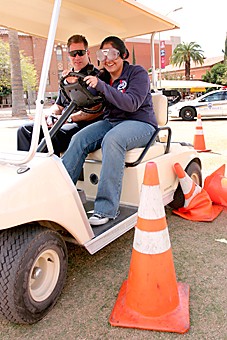Students attended a nontraditional “”happy hour”” hosted by campus leaders that gave them a feel for what it’s like to drive drunk and provided information about liquor laws in Mexico and spring break safety tips on the UA Mall yesterday.
The second annual “”Happy Hour”” spring break event was hosted by the University of Arizona Police Department and the Dean of Students Office to inform students how to protect themselves if they spend spring break in Mexico.
Students were able to get information on Mexican car insurance, travel safety, alcohol education, health education and personal safety from about 25 different health and safety agencies.
Those present included the chiefs of police of Nogales and Mexico, Campus Health Service, the Governor’s Office of Highway Safety, UAPD, Tucson Police Department and Tucson Fire Department. Much of the information featured tips about Mexico, a popular spring break destination for college students.
UAPD officer Frank Romero helped organize the event and said students seem to have the most conflict in Mexico because they don’t know the laws and procedures.
At the event, students were provided with information on who to contact in Mexico if they’re in a car accident or have some other type of emergency.
“”For a lot of students, it’s their first time in a different country, and they don’t know what to expect,”” he said. “”They don’t know what resources are available to them.””
Romero said although the majority of students won’t have any problems during spring break, a handful will likely be victims of crime.
Others may be arrested or cited.
Although 18-year-olds can drink legally in Mexico, if they come back across the border with alcohol in their systems, they can be cited for underage drinking. This is something most students don’t realize, Romero said.
Romero said the event is a preventative measure.
“”Why wait for a tragedy to happen?”” he asked. “”We want students to have a good time and to come home safely.””
The drunk driving obstacle course was very popular with students. A crowd watched as different drivers put on “”beer goggles”” and tried to navigate their ways through an obstacle course without hitting any orange cones.
Undeclared freshman Kevin Bennett hit four cones and said the obstacle course was harder than he expected.
“”It’s hard to see, at first you think you got it, but then one goes down and then two,”” he said.
Bennett, who said he’ll likely be in Rocky Point, Mexico, over the break, said he thought the Happy Hour event was a great idea because students often think spring break is a time to party and forget to be careful.
In addition to alcohol and border issues, there was information on road safety, safe sex and skin cancer.
Road safety is a big part of spring break because many students drive to their destinations, said Sean M. Hammond, project coordinator for the Governor’s Office of Highway Safety,
Hammond said students need to remember to wear their seatbelts on road trips and to have a designated driver.
“”And that doesn’t mean the person who’s least drunk; have someone who didn’t drink all night,”” he said.
Hammond said it’s also important to be careful on the drive back to Tucson because it’s easy to fall asleep after an eventful vacation.
Tucson Fire Department reminded students to not lay out on the beach all day.
Family studies and human development sophomore Kyle Steinke said she is going to California over the break and picked up information on skin cancer from the Campus Health booth.
Steinke said it’s something to watch out for over spring break and in Tucson.
The Campus Health booth also handed out condoms, suntan lotion, lip protection and T-shirts.
Communications senior Corinn Wilson said she thought the event was a good idea and said she hopes people pay attention to the tips offered.
“”People get hyped up and think spring break is all about going out and getting drunk and having butt-naked sex,”” she said.
Wilson said she’s heard of students going to Mexico and getting thrown in jail for being drunk and said students need to be careful.
“”People need to think about the long-term repercussions,”” she said.









